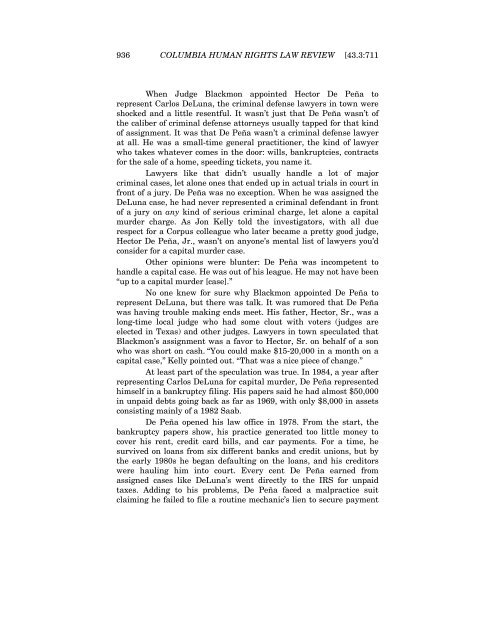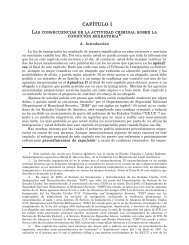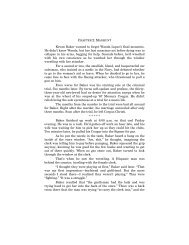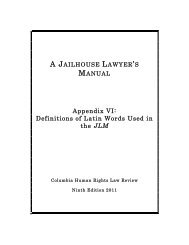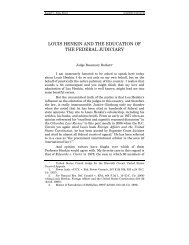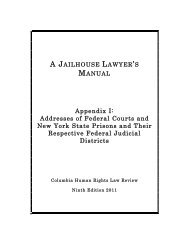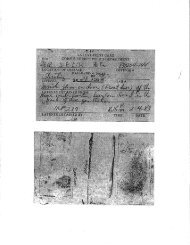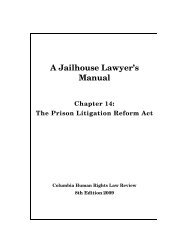Hector De Peña was the first lawyer assigned to defend Carlos ...
Hector De Peña was the first lawyer assigned to defend Carlos ...
Hector De Peña was the first lawyer assigned to defend Carlos ...
Create successful ePaper yourself
Turn your PDF publications into a flip-book with our unique Google optimized e-Paper software.
936 COLUMBIA HUMAN RIGHTS LAW REVIEW [43.3:711<br />
When Judge Blackmon appointed <strong>Hec<strong>to</strong>r</strong> <strong>De</strong> <strong>Peña</strong> <strong>to</strong><br />
represent <strong>Carlos</strong> <strong>De</strong>Luna, <strong>the</strong> criminal defense <strong>lawyer</strong>s in <strong>to</strong>wn were<br />
shocked and a little resentful. It <strong>was</strong>n’t just that <strong>De</strong> <strong>Peña</strong> <strong>was</strong>n’t of<br />
<strong>the</strong> caliber of criminal defense at<strong>to</strong>rneys usually tapped for that kind<br />
of assignment. It <strong>was</strong> that <strong>De</strong> <strong>Peña</strong> <strong>was</strong>n’t a criminal defense <strong>lawyer</strong><br />
at all. He <strong>was</strong> a small-time general practitioner, <strong>the</strong> kind of <strong>lawyer</strong><br />
who takes whatever comes in <strong>the</strong> door: wills, bankruptcies, contracts<br />
for <strong>the</strong> sale of a home, speeding tickets, you name it.<br />
Lawyers like that didn’t usually handle a lot of major<br />
criminal cases, let alone ones that ended up in actual trials in court in<br />
front of a jury. <strong>De</strong> <strong>Peña</strong> <strong>was</strong> no exception. When he <strong>was</strong> <strong>assigned</strong> <strong>the</strong><br />
<strong>De</strong>Luna case, he had never represented a criminal <strong>defend</strong>ant in front<br />
of a jury on any kind of serious criminal charge, let alone a capital<br />
murder charge. As Jon Kelly <strong>to</strong>ld <strong>the</strong> investiga<strong>to</strong>rs, with all due<br />
respect for a Corpus colleague who later became a pretty good judge,<br />
<strong>Hec<strong>to</strong>r</strong> <strong>De</strong> <strong>Peña</strong>, Jr., <strong>was</strong>n’t on anyone’s mental list of <strong>lawyer</strong>s you’d<br />
consider for a capital murder case.<br />
O<strong>the</strong>r opinions were blunter: <strong>De</strong> <strong>Peña</strong> <strong>was</strong> incompetent <strong>to</strong><br />
handle a capital case. He <strong>was</strong> out of his league. He may not have been<br />
“up <strong>to</strong> a capital murder [case].”<br />
No one knew for sure why Blackmon appointed <strong>De</strong> <strong>Peña</strong> <strong>to</strong><br />
represent <strong>De</strong>Luna, but <strong>the</strong>re <strong>was</strong> talk. It <strong>was</strong> rumored that <strong>De</strong> <strong>Peña</strong><br />
<strong>was</strong> having trouble making ends meet. His fa<strong>the</strong>r, <strong>Hec<strong>to</strong>r</strong>, Sr., <strong>was</strong> a<br />
long-time local judge who had some clout with voters (judges are<br />
elected in Texas) and o<strong>the</strong>r judges. Lawyers in <strong>to</strong>wn speculated that<br />
Blackmon’s assignment <strong>was</strong> a favor <strong>to</strong> <strong>Hec<strong>to</strong>r</strong>, Sr. on behalf of a son<br />
who <strong>was</strong> short on cash. “You could make $15-20,000 in a month on a<br />
capital case,” Kelly pointed out. “That <strong>was</strong> a nice piece of change.”<br />
At least part of <strong>the</strong> speculation <strong>was</strong> true. In 1984, a year after<br />
representing <strong>Carlos</strong> <strong>De</strong>Luna for capital murder, <strong>De</strong> <strong>Peña</strong> represented<br />
himself in a bankruptcy filing. His papers said he had almost $50,000<br />
in unpaid debts going back as far as 1969, with only $8,000 in assets<br />
consisting mainly of a 1982 Saab.<br />
<strong>De</strong> <strong>Peña</strong> opened his law office in 1978. From <strong>the</strong> start, <strong>the</strong><br />
bankruptcy papers show, his practice generated <strong>to</strong>o little money <strong>to</strong><br />
cover his rent, credit card bills, and car payments. For a time, he<br />
survived on loans from six different banks and credit unions, but by<br />
<strong>the</strong> early 1980s he began defaulting on <strong>the</strong> loans, and his credi<strong>to</strong>rs<br />
were hauling him in<strong>to</strong> court. Every cent <strong>De</strong> <strong>Peña</strong> earned from<br />
<strong>assigned</strong> cases like <strong>De</strong>Luna’s went directly <strong>to</strong> <strong>the</strong> IRS for unpaid<br />
taxes. Adding <strong>to</strong> his problems, <strong>De</strong> <strong>Peña</strong> faced a malpractice suit<br />
claiming he failed <strong>to</strong> file a routine mechanic’s lien <strong>to</strong> secure payment


